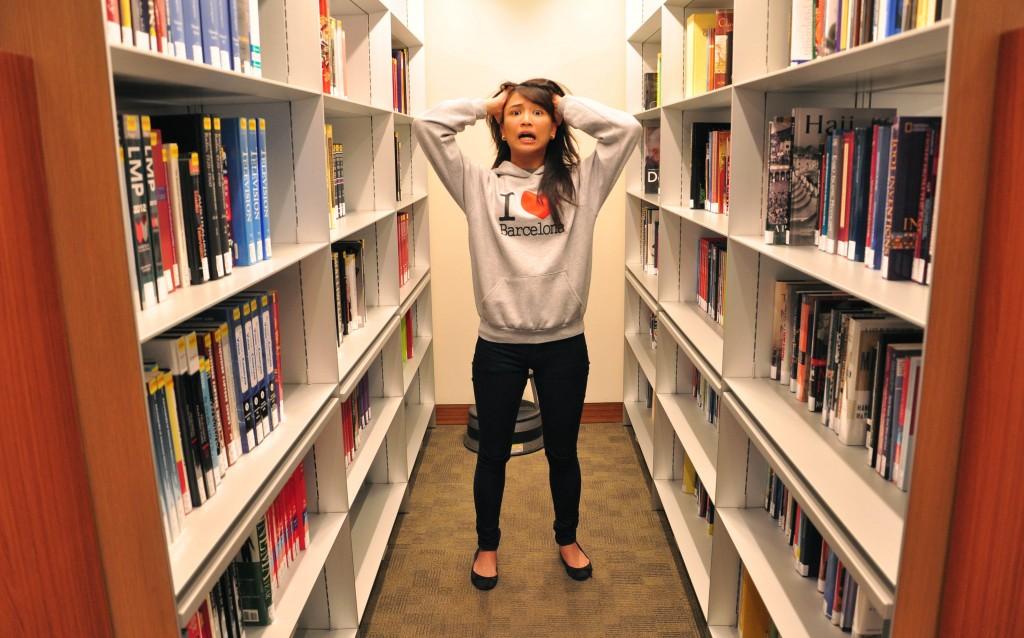By Marium Saeed

Your shoulders are tensing up. You’re seeing a steady decrease in the number of hours you sleep and an equally steady increase in the amount of stress you’re feeling. These are all signs of one thing: finals week.
With deadlines for final projects, research papers and exams piling up, universities around Education City are preparing an array of different health and physical activities to help students manage the stress.
A 2013 study showed that over the last 12 months, 39.2 per cent of U.S. college students experienced “average stress,” while 40.8 per cent reported “more than average stress.”
Thuraya Lutfi, a junior at the Georgetown University School of Foreign Service in Qatar juggling classes and two jobs, said that similar levels of stress could easily be found in the Middle East.
“Our Arab culture highly values education…because of the importance given to education in this region of the world, students often feel pressured to do well in their studies and graduate,” said Lutfi. “The stress pattern is not exclusive to the United States. On the contrary, it may even be greater in the Middle East.”
A large contributor to the high levels of stress that students face lies in the fact that they “often practice poor stress management during exams week, where they do not prioritize sleep or mental-wellbeing,” said Dalia Rehal, student development coordinator at Carnegie Mellon University in Qatar.
To remedy these issues, “de-stress Zones are held during final exams week to raise awareness about the physical and emotional effects of stress and highlight the importance of sleep and stress management during peak exam times,” Rehal said. Other universities also hold similar events.
Despite the availability of information sessions and stress-reducing activities ranging from yoga to massages, students like Gihad Ataalla find themselves too busy with work to attend these activities, which often last an hour or longer.
“I think people just find different ways of dealing with stress. The important thing is to do something you like,” Ataalla said. “Even though I don’t always attend these things, I find things like music helpful.”
Although she is used to the hectic lifestyle that comes with college, Lutfi said that the stress of this academic year is still quite high. In addition to trying to manage her time wisely, Lutfi said that taking a few hours a day to unwind is crucial in stress-reduction.
“I make it a priority to attend one of the stress buster activities provided for the students, which includes meditation circles, free exam-time massage treatments, academic counseling and much more,” she said.
Even though she doesn’t attend stress buster events religiously, Ataalla does feel the difference in her stress levels when she sets time aside for events like the “Relax and Refresh Hour” at VCU-Q, which includes a yoga session.
“You go into deep sleep in no time and just you feel that your whole body is relaxed and all the whole tension is gone…you’re not even thinking, ‘I have a deadline in three hours or I have a paper due tomorrow morning’…its just something for you,” she said.
But another crucial aspect of stress management lies not in using stress balls, or attending information sessions, but in learning to view stress positively, something that universities also focus on.
“We also had an expert facilitate a workshop…which focused on building tools to perceive stress differently and manage it effectively,” said Mahnaz Mousavi, director of Student Wellness & Counseling at GUSFS-Q.
Using the words stress and positive together may seem like a contradiction in itself, but according to psychologists like Kelly McGonigal, “when you change your mind about stress you can change your body’s response to stress.”
Rather than perceiving your body’s response to stress – the tense shoulders, increased heart rate and faster breathing – as a negative thing or as a sign that you’re not coping well, perceiving this response as your body rising to the challenge actually makes stress less harmful for you, advised McGonigal.
